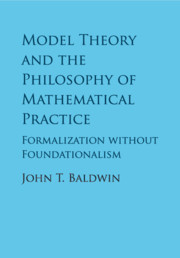Book contents
- Frontmatter
- Dedication
- Contents
- List of Figures
- Acknowledgments
- Introduction
- PART I REFINING THE NOTION OF CATEGORICITY
- PART II THE PARADIGM SHIFT
- 4 What Was Model Theory About?
- 5 What Is Contemporary Model Theory About?
- 6 Isolating Tame Mathematics
- 7 Infinitary Logic
- 8 Model Theory and Set Theory
- PART III GEOMETRY
- PART IV METHODOLOGY
- References
- Index
8 - Model Theory and Set Theory
from PART II - THE PARADIGM SHIFT
Published online by Cambridge University Press: 19 January 2018
- Frontmatter
- Dedication
- Contents
- List of Figures
- Acknowledgments
- Introduction
- PART I REFINING THE NOTION OF CATEGORICITY
- PART II THE PARADIGM SHIFT
- 4 What Was Model Theory About?
- 5 What Is Contemporary Model Theory About?
- 6 Isolating Tame Mathematics
- 7 Infinitary Logic
- 8 Model Theory and Set Theory
- PART III GEOMETRY
- PART IV METHODOLOGY
- References
- Index
Summary
We chronicle here the divorce of first order model theory from set theory. Recalling Maddy's [Maddy 2007] injunction (page 13) to ‘adjudicate the methodological questions of mathematics – what makes for a good definition,’ we explain this major aspect of the paradigm shift as the decision to choose definitions of model theoretic concepts that reduce the set theoretic overhead. To explore this development we follow the prescription of Thesis 2: connect various local formalizations. That is, we look at formalized set theory ZFC and analyze its use in model theory.
These investigations expand on recent work studying the entanglement of mathematics with set theory [Kennedy 2015, Kennedy 2013, Parsons 2013, Väänänen 2012]. These works, as on page 46, find that the amount of entanglement depends crucially on the logic chosen for formalizing mathematics. Paraphrasing Väänänen [Väänänen 2012], it is very difficult to tell the difference between the second order view (mathematics is the study of higher order properties of structures) and the set theory view (formalizing mathematics in set theory); see Chapters 7.3 and 11. The high entanglement of second order logic with set theory is expressed more precisely by it being symbiotic with the power set [Kennedy 2015]. Parsons’ general theme in [Parsons 2013] is closer to the approach in this chapter. He considers, a bit more generally, logic and mathematics, and argues that the ontological commitments of first order logic are relatively weak. But his argument is not a general metaphysical one. Similarly to Maddy's Second Philosopher he precisely analyzes the commitments within second order arithmetic for specific results in the basic model theory. For example, he points to the fact [Simpson 2009] that the completeness theorem is equivalent to weak König's lemma over RCA0. Analogously we investigate the necessity in contemporary first order and infinitary model theory of specific ZFC techniques or specific axioms. To what extent should, could, or must a model theorist go beyond ZFC?
What are the specific commitments for doing model theory (as opposed to mathematics in general)? We consider six aspects of the interaction of set theory and model theory. In the first section, we describe an apparent close relation between model theory and set theory that was dissolved by the paradigm shift.
- Type
- Chapter
- Information
- Model Theory and the Philosophy of Mathematical PracticeFormalization without Foundationalism, pp. 177 - 200Publisher: Cambridge University PressPrint publication year: 2018



